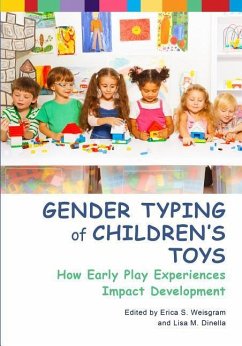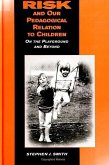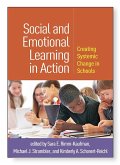Gender Typing of Children's Toys: How Early Play Experiences Impact Development
Herausgeber: Weisgram, Erica; Dinella, Lisa M.
Gender Typing of Children's Toys: How Early Play Experiences Impact Development
Herausgeber: Weisgram, Erica; Dinella, Lisa M.
- Gebundenes Buch
- Merkliste
- Auf die Merkliste
- Bewerten Bewerten
- Teilen
- Produkt teilen
- Produkterinnerung
- Produkterinnerung
In this volume, scholars in developmental psychology, education, and neuroscience examine the ways in which children’s toys often reflect and promote gender stereotypes, as well as the long-term consequences of gender-typed play.
Andere Kunden interessierten sich auch für
![Risk and Our Pedagogical Relation to Children: On the Playground and Beyond Risk and Our Pedagogical Relation to Children: On the Playground and Beyond]() Stephen J. SmithRisk and Our Pedagogical Relation to Children: On the Playground and Beyond106,99 €
Stephen J. SmithRisk and Our Pedagogical Relation to Children: On the Playground and Beyond106,99 €![Gender and Sexual Diversity in Schools Gender and Sexual Diversity in Schools]() Elizabeth J. MeyerGender and Sexual Diversity in Schools74,99 €
Elizabeth J. MeyerGender and Sexual Diversity in Schools74,99 €![Gender and Sexual Diversity in Schools Gender and Sexual Diversity in Schools]() Elizabeth J. MeyerGender and Sexual Diversity in Schools75,99 €
Elizabeth J. MeyerGender and Sexual Diversity in Schools75,99 €![From Illiteracy to Literature From Illiteracy to Literature]() Anne-Marie PicardFrom Illiteracy to Literature191,99 €
Anne-Marie PicardFrom Illiteracy to Literature191,99 €![Advances in Teacher Emotion Research Advances in Teacher Emotion Research]() Paul A. Schutz / Michalinos Zembylas (ed.)Advances in Teacher Emotion Research189,99 €
Paul A. Schutz / Michalinos Zembylas (ed.)Advances in Teacher Emotion Research189,99 €![Social and Emotional Learning in Action Social and Emotional Learning in Action]() Social and Emotional Learning in Action82,99 €
Social and Emotional Learning in Action82,99 €![Handbook of Giftedness and Talent Development in the Asia-Pacific [With eBook] Handbook of Giftedness and Talent Development in the Asia-Pacific [With eBook]]() Handbook of Giftedness and Talent Development in the Asia-Pacific [With eBook]571,99 €
Handbook of Giftedness and Talent Development in the Asia-Pacific [With eBook]571,99 €-
-
-
In this volume, scholars in developmental psychology, education, and neuroscience examine the ways in which children’s toys often reflect and promote gender stereotypes, as well as the long-term consequences of gender-typed play.
Hinweis: Dieser Artikel kann nur an eine deutsche Lieferadresse ausgeliefert werden.
Hinweis: Dieser Artikel kann nur an eine deutsche Lieferadresse ausgeliefert werden.
Produktdetails
- Produktdetails
- Verlag: American Psychological Association (APA)
- Seitenzahl: 341
- Erscheinungstermin: 27. Februar 2018
- Englisch
- Abmessung: 257mm x 183mm x 20mm
- Gewicht: 771g
- ISBN-13: 9781433828867
- ISBN-10: 1433828863
- Artikelnr.: 50012792
- Herstellerkennzeichnung
- Libri GmbH
- Europaallee 1
- 36244 Bad Hersfeld
- 06621 890
- Verlag: American Psychological Association (APA)
- Seitenzahl: 341
- Erscheinungstermin: 27. Februar 2018
- Englisch
- Abmessung: 257mm x 183mm x 20mm
- Gewicht: 771g
- ISBN-13: 9781433828867
- ISBN-10: 1433828863
- Artikelnr.: 50012792
- Herstellerkennzeichnung
- Libri GmbH
- Europaallee 1
- 36244 Bad Hersfeld
- 06621 890
Erica S. Weisgram, PhD, is professor of psychology at University of Wisconsin–Stevens Point (UWSP). Her research focuses broadly on gender development in children, adolescents, and young adults. Her recent work explores the cognitive construction of stereotypes in preschool children and how cultural stereotypes affect children’s interest in toys. She also examines how gender and gender-related factors (e.g., stereotypes, values, familial roles) affect individuals’ occupational and academic interests with a specific focus on girls’ and women’s interest in math and science occupations. Dr. Weisgram earned her bachelor’s degree at Luther College and her PhD at The University of Texas at Austin. She is the 2016 winner of the UWSP Justus Paul Sabbatical Award and the UWSP Excellence in Teaching Award. Lisa M. Dinella, PhD, is a research scientist who investigates the relations between gender, academic achievement, and career development. Dr. Dinella studies children’s toy play and media exposure, and how gendered experiences shape academic and career pursuits across the lifespan. She is principal investigator of the Gender Development Laboratory at Monmouth University, where she is associate professor of psychology and affiliated faculty member of Gender Studies. Her school-based research endeavors led to her edited book Conducting Science-Based Psychology Research in Schools . Dr. Dinella recently presented on gender disparities in children’s media and toys at The White House in Washington, DC. She drew from her research to provide key recommendations to toy, media, and youth-serving organizations on how to break down gender stereotypes.
Contents
Contributors
Introduction
Erica S. Weisgram and Lisa M. Dinella
Part I: Toy Preferences and Gender
Chapter 1: Gender Typing of Toys in Historical and Contemporary Contexts
Erica S. Weisgram
Chapter 2: Research Methods in Studying Gender and Toy Preferences
Lisa M. Dinella
Chapter 3: Gender-Typed Toy Preferences Among Infants and Toddlers
Kristina M. Zosuls and Diane N. Ruble
Chapter 4: Characteristics of Masculine and Feminine Toys and
Gender-Differentiated Play
Isabelle D. Cherney
Part II: Causes of Children’s Gender-Typed Toy Play
Chapter 5: Sex Hormones and Children’s Gender-Typed Toy Play
Melissa Hines and Jacqueline Davis
Chapter 6: Environmental and Social Contributions to Children’s
Gender-Typed Toy Play: The Role of Family, Peers, and Media
Christia Spears Brown and Ellen A. Stone
Chapter 7: Cognitive Perspectives on Children’s Toy Choices
Carol Lynn Martin and Rachel E. Cook
Part III: Consequences of Gender-Typed Toy Play
Chapter 8: Impact of Gender-Typed Toys on Children’s Neurological
Development
Lise Eliot
Chapter 9: Fashion or Action? Gender-Stereotyped Toys and Social Behavior
Sarah K. Murnen
Chapter 10: Cognitive Consequences of Gendered Toy Play
Lynn S. Liben, Kingsley M. Schroeder, Giulia A. Borriello, and Erica S.
Weisgram
Chapter 11: Working at Play: Gender-Typed Play and Children’s Visions of
Future Work and Family Roles
Megan Fulcher and Emily F. Coyle
Chapter 12: Societal Causes and Consequences of Gender Typing of Children’s
Toys
Campbell Leaper and Rebecca S. Bigler
Chapter 13: Conclusion: Toward a Greater Understanding of Children’s
Gender-Typed Toy Play
Erica S. Weisgram and Lisa M. Dinella
Index
About the Editors
Contributors
Introduction
Erica S. Weisgram and Lisa M. Dinella
Part I: Toy Preferences and Gender
Chapter 1: Gender Typing of Toys in Historical and Contemporary Contexts
Erica S. Weisgram
Chapter 2: Research Methods in Studying Gender and Toy Preferences
Lisa M. Dinella
Chapter 3: Gender-Typed Toy Preferences Among Infants and Toddlers
Kristina M. Zosuls and Diane N. Ruble
Chapter 4: Characteristics of Masculine and Feminine Toys and
Gender-Differentiated Play
Isabelle D. Cherney
Part II: Causes of Children’s Gender-Typed Toy Play
Chapter 5: Sex Hormones and Children’s Gender-Typed Toy Play
Melissa Hines and Jacqueline Davis
Chapter 6: Environmental and Social Contributions to Children’s
Gender-Typed Toy Play: The Role of Family, Peers, and Media
Christia Spears Brown and Ellen A. Stone
Chapter 7: Cognitive Perspectives on Children’s Toy Choices
Carol Lynn Martin and Rachel E. Cook
Part III: Consequences of Gender-Typed Toy Play
Chapter 8: Impact of Gender-Typed Toys on Children’s Neurological
Development
Lise Eliot
Chapter 9: Fashion or Action? Gender-Stereotyped Toys and Social Behavior
Sarah K. Murnen
Chapter 10: Cognitive Consequences of Gendered Toy Play
Lynn S. Liben, Kingsley M. Schroeder, Giulia A. Borriello, and Erica S.
Weisgram
Chapter 11: Working at Play: Gender-Typed Play and Children’s Visions of
Future Work and Family Roles
Megan Fulcher and Emily F. Coyle
Chapter 12: Societal Causes and Consequences of Gender Typing of Children’s
Toys
Campbell Leaper and Rebecca S. Bigler
Chapter 13: Conclusion: Toward a Greater Understanding of Children’s
Gender-Typed Toy Play
Erica S. Weisgram and Lisa M. Dinella
Index
About the Editors
Contents
Contributors
Introduction
Erica S. Weisgram and Lisa M. Dinella
Part I: Toy Preferences and Gender
Chapter 1: Gender Typing of Toys in Historical and Contemporary Contexts
Erica S. Weisgram
Chapter 2: Research Methods in Studying Gender and Toy Preferences
Lisa M. Dinella
Chapter 3: Gender-Typed Toy Preferences Among Infants and Toddlers
Kristina M. Zosuls and Diane N. Ruble
Chapter 4: Characteristics of Masculine and Feminine Toys and
Gender-Differentiated Play
Isabelle D. Cherney
Part II: Causes of Children’s Gender-Typed Toy Play
Chapter 5: Sex Hormones and Children’s Gender-Typed Toy Play
Melissa Hines and Jacqueline Davis
Chapter 6: Environmental and Social Contributions to Children’s
Gender-Typed Toy Play: The Role of Family, Peers, and Media
Christia Spears Brown and Ellen A. Stone
Chapter 7: Cognitive Perspectives on Children’s Toy Choices
Carol Lynn Martin and Rachel E. Cook
Part III: Consequences of Gender-Typed Toy Play
Chapter 8: Impact of Gender-Typed Toys on Children’s Neurological
Development
Lise Eliot
Chapter 9: Fashion or Action? Gender-Stereotyped Toys and Social Behavior
Sarah K. Murnen
Chapter 10: Cognitive Consequences of Gendered Toy Play
Lynn S. Liben, Kingsley M. Schroeder, Giulia A. Borriello, and Erica S.
Weisgram
Chapter 11: Working at Play: Gender-Typed Play and Children’s Visions of
Future Work and Family Roles
Megan Fulcher and Emily F. Coyle
Chapter 12: Societal Causes and Consequences of Gender Typing of Children’s
Toys
Campbell Leaper and Rebecca S. Bigler
Chapter 13: Conclusion: Toward a Greater Understanding of Children’s
Gender-Typed Toy Play
Erica S. Weisgram and Lisa M. Dinella
Index
About the Editors
Contributors
Introduction
Erica S. Weisgram and Lisa M. Dinella
Part I: Toy Preferences and Gender
Chapter 1: Gender Typing of Toys in Historical and Contemporary Contexts
Erica S. Weisgram
Chapter 2: Research Methods in Studying Gender and Toy Preferences
Lisa M. Dinella
Chapter 3: Gender-Typed Toy Preferences Among Infants and Toddlers
Kristina M. Zosuls and Diane N. Ruble
Chapter 4: Characteristics of Masculine and Feminine Toys and
Gender-Differentiated Play
Isabelle D. Cherney
Part II: Causes of Children’s Gender-Typed Toy Play
Chapter 5: Sex Hormones and Children’s Gender-Typed Toy Play
Melissa Hines and Jacqueline Davis
Chapter 6: Environmental and Social Contributions to Children’s
Gender-Typed Toy Play: The Role of Family, Peers, and Media
Christia Spears Brown and Ellen A. Stone
Chapter 7: Cognitive Perspectives on Children’s Toy Choices
Carol Lynn Martin and Rachel E. Cook
Part III: Consequences of Gender-Typed Toy Play
Chapter 8: Impact of Gender-Typed Toys on Children’s Neurological
Development
Lise Eliot
Chapter 9: Fashion or Action? Gender-Stereotyped Toys and Social Behavior
Sarah K. Murnen
Chapter 10: Cognitive Consequences of Gendered Toy Play
Lynn S. Liben, Kingsley M. Schroeder, Giulia A. Borriello, and Erica S.
Weisgram
Chapter 11: Working at Play: Gender-Typed Play and Children’s Visions of
Future Work and Family Roles
Megan Fulcher and Emily F. Coyle
Chapter 12: Societal Causes and Consequences of Gender Typing of Children’s
Toys
Campbell Leaper and Rebecca S. Bigler
Chapter 13: Conclusion: Toward a Greater Understanding of Children’s
Gender-Typed Toy Play
Erica S. Weisgram and Lisa M. Dinella
Index
About the Editors








![Handbook of Giftedness and Talent Development in the Asia-Pacific [With eBook] Handbook of Giftedness and Talent Development in the Asia-Pacific [With eBook]](https://bilder.buecher.de/produkte/54/54163/54163012m.jpg)